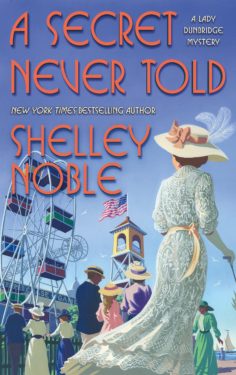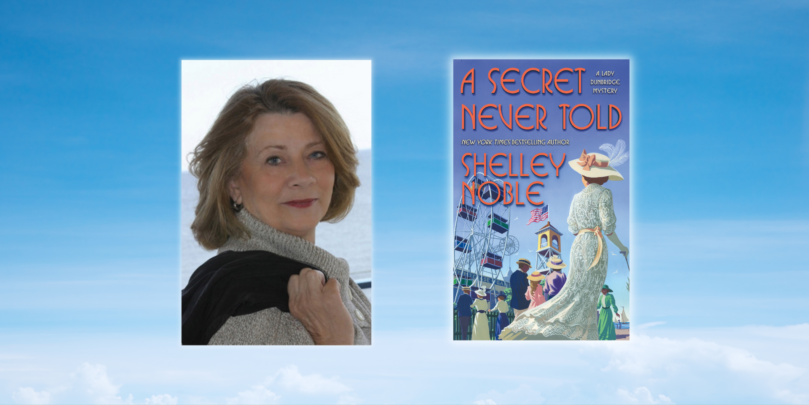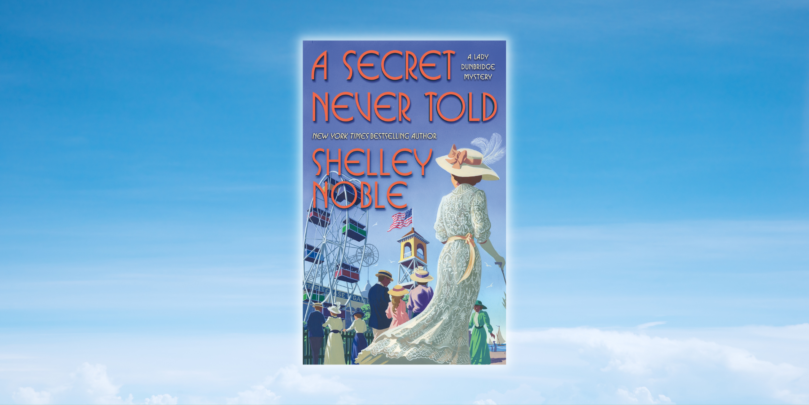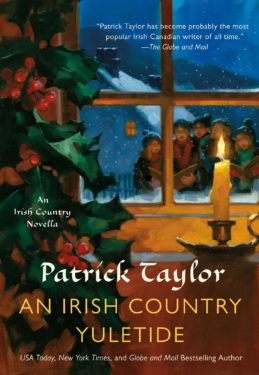opens in a new window
Miss Fisher meets Downton Abbey in A Secret Never Told, the fourth installment in the critically acclaimed mystery series from New York Times bestselling author Shelley Noble.
Philomena Amesbury, expatriate Countess of Dunbridge, is bored. Coney Island in the sweltering summer of 1908 offers no shortage of diversions for a young woman of means, but sea bathing, horse racing, and even amusement parks can’t hold a candle to uncovering dastardly plots and chasing villains. Lady Dunbridge hadn’t had a big challenge in months.
Fate obliges when Phil is called upon to host a dinner party in honor of a visiting Austrian psychologist whose revolutionary theories may be of interest to the War Department, not to mention various foreign powers, and who may have already survived one attempt on his life. The guest list includes a wealthy industrialist, various rival scientists and academics, a party hypnotist, a flamboyant party-crasher, and a damaged beauty whose cloudy psyche is lost in a world of its own. Before the night is out, one of the guests is dead with a bullet between the eyes and Phil finds herself with another mystery on her hands, even if it’s unclear who exactly the intended victim was meant to be.
Worse yet, the police’s prime suspect is a mystery man who Phil happens to be rather intimately acquainted with. Now it’s up to Lady Dunbridge, with the invaluable assistance of her intrepid butler and lady’s maid, to find the real culprit before the police nab the wrong one . . .
opens in a new windowA Secret Never Told will be available on November 23rd, 2021. Please enjoy the following excerpt!
1
Philomena Amesbury, Countess of Dunbridge, sat on the veranda of the Manhattan Beach Hotel, sipping a glass of champagne and looking out at the dark ocean. To her right, the rowdy display of lights from Coney Island beckoned the masses.
But on the veranda of this jewel of beach hotels, the diners were enjoying a quiet decorum—some more quiet than others, depending on their losses and wins at the Brighton Beach track that afternoon.
Phil and her friend Bev Reynolds had been here for nearly a week. Bev, who had had two horses running, spent her mornings at the stable, then joined Phil for a day of sunbathing and dipping their feet in the ocean. They’d spent one day discovering the wonders of nearby Coney Island amusement parks. They’d drunk lemonade and hiked up their skirts to ride the Steeplechase, a mechanical wooden racehorse ride. Neither of them won. They’d screamed delightedly as they rose to dizzying heights for a trip on the revolving airships. They’d even managed to cling to the Human Roulette Wheel as it revolved faster and faster, throwing off passengers without regard to gentlemen’s hats or ladies’ skirts.
They attended the races at the Brighton Beach track. At night, they rubbed elbows with members of the Jockey Club and danced with dashing men in the moonlight to the hotel orchestra.
And yet Phil felt an overwhelming, enervating sense of . . . ennui.
There, she’d admitted it. The fact of the matter was, the Countess of Dunbridge was bored.
Sea bathing, horse racing, even amusement parks didn’t hold a candle to uncovering dastardly plots and chasing villains. And there had been very little of that lately. She hadn’t had a big challenge in months. And not a major one since New Year’s Eve. But that had been 1907. Now it was June, and 1908 had so far been very unproductive.
Her thoughts were interrupted by a boisterous crowd carrying one of their members on their shoulders bursting through the doors of the veranda restaurant.
They gained more than a few disapproving looks. This was not the behavior considered de rigueur by the exclusive Manhattan Beach Hotel. But it was also the hotel of choice of the Brooklyn Jockey Club, whose largesse was important to the hotel’s success, and so a little leeway was accorded.
Bev Reynolds led the way, looking resplendent in a teal-blue gown, trimmed with silver spangles and sporting a train of black tulle. The ocean air had wound her blond hair into tight curls, barely restrained by a sequined bandeau.
Since they’d both given their maids a holiday, Phil had opted for a fitted silver sheath made from one of the new stretch fabrics and an organza midlength jacket, both designed for easy dressing. She didn’t mind “living rough,” as Bev delightedly called anything that didn’t include “a retinue of people telling you what to do and when to do it.”
Bev saw Phil, held out both hands in greeting, and made a beeline for the table. “A celebration and a wake,” she proclaimed.
“A celebration of Devil’s Delight winning me an obscenely large purse this afternoon. And black,” she added, twirling to show off her train, “since the antibetting law has just passed and this will likely be the last week for gambling. Legal gambling, anyway. How will anyone make a living?”
She sighed, snatched up an empty glass, and poured herself champagne from the bottle chilling in the ice bucket. “I’ll be forced to take the horses to Texas and Arizona and those other places out there.” Places she dismissed with a flick of her fingers and a shudder.
She turned to her motley entourage, most of whom stood barely over five feet tall, being jockeys and not exotic entertainers from the Coney Island amusements a few blocks away. They crowded round the table; waiters appeared immediately with trays of champagne.
Bobby Mullins, Bev’s stable manager—formerly her deceased husband’s right-hand man, now Bev’s—stepped forward.
Stocky and medium height, Bobby was a former boxing champion, reformed denizen of the city’s underworld, and unapologetic lover of chorus girls. He dragged his derby from his head, unleashing a mass of untamable orange-red hair that, Phil noticed, was now laced with silver.
“To Miz Reynolds!” he exclaimed, and lifted his glass. “To Miz Reynolds,” they all agreed, and drank her health.
“To Holly Farm Stables,” Bev returned. “And to all of you.” They drank again. Glasses were hurriedly refilled.
“To Devil’s Delight,” yelled one of the crowd. “Devil’s Delight!”
“And Johnny D!”
The little man, who still sat astride a set of brawnier shoulders than his, bowed to his fellow revelers and waved to the other astonished diners.
“And to Madame Zhora!” Johnny added. “Madame Zhora!” they chanted.
“Okay, you lot,” Bobby said. “Off you go. They’ve got a fine dinner waiting over at the Pabst for you. Curfew is extended until midnight, but don’t forget, there’s another big race tomorrow.”
With a final cheer, they emptied their glasses and took themselves off, noisier, if possible, than when they entered.
The restaurant sighed into quiet conversation.
“Sit down, Bobby, and have some more champagne,” Bev said.
Bobby chewed the inside of his cheek, looking like he wished he could join his men in a boisterous dinner and evening on the town, but he sat.
“Congratulations,” Phil said, rousing some enthusiasm. “Devil’s Delight was certainly a delight today. And Juan”—the Johnny they’d just been toasting—“rode him perfectly. Kudos to you all. But who on earth is Madame Zhora?”
Bobby scratched his head, unleashing even more unruly wires of hair. “She has a place over at Steeplechase Park. The boys go to her to have their fortunes told. You know, predict how they’ll do in the coming races. If they’re gonna be rich or find themselves a wife.”
“Really?” Phil asked. “What happens if she predicts a loss?” “Gawd, your-ness.”
After a year of knowing her, Bobby still had never figured out exactly how to address her. And she was too entertained by his attempts to correct him.
“She don’t never give them a bad fortune. She tells ’em they’re gonna win, make lots of money, and marry a beautiful wife. In return, I drop her the occasional betting tip. Everybody’s happy.”
Phil laughed. “Well, in that case . . .”
A bellboy paused at their table. “Telephone call for Lady Dunbridge.”
A ripple of excitement coursed through Phil that had nothing to do with winning horses. At last . . .
“I’m Lady Dunbridge.” Dowager, if Phil was truthful, but she saw no reason to announce it—ever. It wasn’t her fault that the earl dropped dead shortly after her twenty-sixth birthday.
Bev frowned. “I hope it isn’t bad news.”
“Oh.” Phil hadn’t thought of that. Preswick and Lily? She’d left them both in the city to have a few days off. What if something had happened to one of them? They might be servants, but she didn’t know what she would do without them. And here she’d been selfishly hoping for a murder.
“Surely not. Excuse me.” She hurried after the bellboy.
She returned a few minutes later. Not grieving, thank heaven. And not excited, but perplexed. She sat down and reached for her champagne.
“Who was it?” demanded Bev.
Bobby’s eyebrows made question marks over his eyes. “It was Godfrey Bennington.”
“Godfrey Bennington—the aeroplane enthusiast?” Phil nodded.
“The richer-than–J. P. Morgan Godfrey Bennington? The Godfrey Bennington who has the ear of every major politician and industrialist in the country? That—?”
Phil nodded. “That one.” “What did he want?”
“He needs me in the city—immediately.”
Bobby groaned. “Oh, your lady-ness, what are you up to this time?”
“Absolutely nothing.” At least not yet. She couldn’t wait.
“You think it’s a ” Bev looked around at the other diners and
leaned closer. “A case?”
“No, of course not. Just because I happened to be a friend of a friend of his when that poor young man was killed, and just happened to be able to help in the ensuing inquiries, that’s no reason to think that he thinks Though he did say it was urgent.”
What could he possibly want? Did this mean that he was part of the “team,” that of her as-yet-unknown employer, who paid for her suite of rooms at the Plaza Hotel, kept her in ready cash, and required only that she do what any self-respecting modern countess would do: prevent criminals from getting away with murder? She knew Godfrey was appreciative of her part in extricating his friends from a volatile and rather scandalous murder, but they had never discussed her actual role in solving the case, nor why she was able to do so. In fact, she’d gotten the distinct feeling that
he was glad to see the back of her.
She was fairly certain he had no idea of the extent of her involvement. She was very discreet. Something she had learned— but rarely practiced—in the ballrooms of England, but had made a strict habit of—thus far—in the New World.
“He’s sending his automobile to take me back to the city in the morning. I suppose I must go.”
“Maybe he wants to take you flying,” Bev said hopefully. “Immediately?”
“A sudden whim?”
“I don’t believe men like Godfrey have sudden whims.” “Maybe it’s a government matter. He does something with the
War Department, doesn’t he?”
“I believe he mentioned that.”
“Something top secret,” Bev continued, her eyes growing round. “I hardly think ”
“A spy ring…. ” Bev sucked in her breath, amazed at the pos-
sibilities she imagined.
It was possible, Phil thought. And to be honest, the idea sent a ripple of excitement through her that even the Loop the Loop hadn’t managed.
“But how did he know where you were and that you didn’t bring your own auto?”
How indeed, Phil wondered.
Pre-order a Copy of A Secret Never Told—available November 23rd!
opens in a new window
opens in a new window
opens in a new window
opens in a new window
opens in a new window
opens in a new window


















